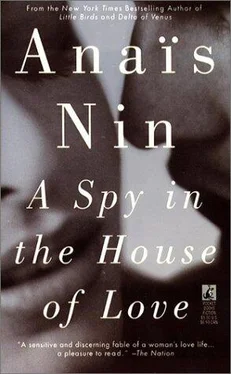She watched Alan closing the windows, watched him light the lamps and fasten the lock on the door which led to the porch. All the sweet enclosures, and yet Sabina, instead of slipping languorously into the warmth and gentleness, felt a sudden restlessness like that of a ship pulling against its moorings.
The image of the ship’s cracking, restless bones arrived on the waves of Debussy’s “Ile Joyeuse” which wove around her all the mists and dissolutions of remote islands. The notes arrived charged like a caravan of spices, gold mitres, ciboriums and chalices bearing messages of delight setting the honey flowing between the thighs, erecting sensual minarets on men’s bodies as they lay flat on the sand. Debris of stained glass wafted up by the seas, splintered by the radium shafts of the sun and the waves and tides of sensuality covered their bodies, desires folding in every lapping wave like an accordion of aurora borealis in the blood. She saw an unreachable dance at which men and women were dressed in rutilant colors, she saw their gaiety, their relations to each other as unparalleled in splendor.
By wishing to be there where it was more marvelous she made the near, the palpable seem like an obstruction, a delay to the more luminous life awaiting her, the incandescent personages kept waiting.
The present—Alan, with his wrists hidden in silky brown hair, his long neck always bending towards her like a very tree of faithfulness—was murdered by the insistent, whispering, interfering dream, a compass pointing to mirages flowing in the music of Debussy like an endless beckoning, alluring, its voices growing fainter if she did not listen with her whole being, its steps lighter if she did not follow, its promises, its sighs of pleasure growing clearer as they penetrated deeper regions of her body directly through the senses bearing on airy canopies all the fluttering banners of gondolas and divertissements.
Debussy’s “Clair de Lune” shone on other cities… She wanted to be in Paris, the city propitious to lovers, where pcemen smiled absolution and taxi drivers never interrupted a kiss…
Debussy’s “Clair de Lune” shone upon many stranger’s faces, upon many Iles Joyeuses, music festivals in the Black Forest, marimbas praying at the feet of smoking volcanoes, frenzied intoxicating dances in Haiti, and she was not there. She was lying in a room with closed windows under a lamplight.
The music grew weary of calling her, the black notes bowed to her inertia ironically in the form of a pavanne for a defunct infanta, and dissolved. All she could hear now were the fog horns on the Hudson from ships she would never be able to board.
Sabina emerged a week later dressed in purple and waited for one of the Fifth Avenue buses which allowed smoking. Once seated she opened an overfull handbag and brought out a Hindu ring with minuscule bells on it, and slipped it on in place of her wedding ring. The wedding ring was pushed to the bottom of the bag. Each gesture she made was now accompanied by the tinkling of bells.
At Sixty-Fourth Street she leaped out of the bus before it had entirely stopped and her walk had changed. She now walked swiftly, directly, with a power and vigor to her hips. She walked with her whole foot flat on the ground as the Latins and the Negroes do. Whereas on her way to Alan’s her shoulders had been bowed, now they were vigorously thrown back and she was breathing deeply, feeling her breasts pushing against the purple dress.
The ripples of her walk started from the pelvis and hips, a strong undulation like waves of muscles flowing from the feet to the knees, to the hips and back to the waist. She walked with her entire body as if to gain momentum for an event in which her entire body would participate. On her face there was no longer any bewilderment, but a vehemence which caused people to stop and glance at her face as if they had been touched by a magnet.
The evening lights were being turned on, and at this hour Sabina felt like the city, as if all the lights were turned on at once causing a vast illumination. There were lights on her hair, in her eyes, on her nails, on the ripples of her purple dress now turning black.
When she finally reached the apartment, she realized she still did not know whether he lived alone.
He guided her into a room which looked like him and had been arranged for him alone. His skiing trophies hung on the walls: on a Viennese curtain of damask hung a whole army of tin soldiers in army formation. On the piano lay stacks of music in disorder, and in the center of the room, under an umbrella hung open from the ceiling, a partly constructed telescope.
“I want to see the stars with my own handmade telescope. I’m now polishing the glass. It takes a long, long time and a great deal of patience.”
“But the umbrella!” exclaimed Sabina laughing.
“The children in the apartment above mine jump around and fine particles of plaster kept falling over my glass, scratching it. The finest grain of dust can spoil a whole day’s polishing.”
She understood his desire to observe the planets through an instrument made by his own hands. She was eager to see it finished and wanted to know how long it would take. Absorbed by the telescope they behaved like friends, and for a moment abandoned the tense challenges and teasings of conquest.
In this mood they undressed. Philip was playfully inventing endless grimaces, as children do. He loved to make himself grotesque as if he were tired of being always flawlessly handsome. He could turn himself into Frankenstein.
Sabina laughed, but uneasily, fearful that if his handsomeness truly vanished she would no longer desire him, aware of the evanescence and fragility of this desire. If the singer of Tristan and Isolde singing in the Black Forest of the fairy tales disappeared, whom would she desire then?
Then his cool eyes became aware of the intensity of her eyes and they stirred him. His detachment was ignited by the smoldering violence in her. He did not want fires or explosions of feeling in a woman, but he wanted to know it was there. He wanted the danger of touching it off only in the dark depths of her flesh, but without rousing a heart that would bind him. He often had fantasies of taking a woman whose arms were bound behind her back.
Once he had seen a heavy storm cloud settle over a twin-nippled mountain, so closely knit, like an embrace and he had said: “Wonderful copulation; the mountain has no arms!”
Now he grew tired of making faces, and having resumed the perfectly modeled features, he bent over her to pay homage to her body.
And then it happened like a miracle, this pulsation of pleasure unequalled by the most exalted musicians, the summits of perfection in art or science or wars, unequalled by the most regal beauties of nature, this pleasure which transformed the body into a high tower of fireworks gradually exploding into fountains of delight through the senses.
She opened her eyes to contemplate the piercing joy of her liberation: she was free, free as man was, to enjoy without love.
Without any warmth of the heart, as a man could, she had enjoyed a stranger.
And then she remembered what she had heard men say: “Then I wanted to leave.”
She gazed at the stranger lying naked beside her and saw him as a statue she did not want to touch again. As a statue he lay far from her, strange to her, and there welled in her something resembling anger, regret, almost a desire to take this gift of herself back, to efface all traces of it, to banish it from her body. She wanted to become swiftly and cleanly detached from him, to disentangle and unmingle what had been fused for a moment, their breaths, skins, exhalations, and body’s essences.
She slid very softly out of the bed, dressed with adroit soundlessness while he slept. She tiptoed to the bathroom.
Читать дальше












